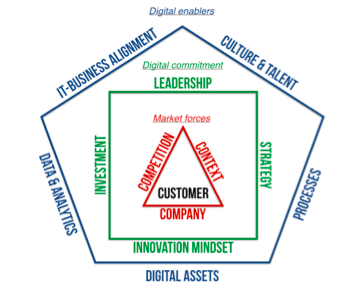- De transformación digital a transformación a secas… ¿Se ha vuelto anticuado el término “transformación digital” o simplemente lo han usado demasiados?
- Los consejos de administración y la transformación ¿digital? en España. ¿Aceleran o entorpecen la transformación?
- Vuelta a la ética. Se acabó el “vale todo” en Internet (gracias Uber por abrirnos los ojos).
- Adicción a Internet y ethic coding.
- La nueva guerra sucia de la opinión: fake followers, noticias falsas y posverdad en las redes sociales.
- Los nuevos jugadores chinos dando guerra en Europa (p.ej., Aliexpress y Xiaomi).
- Revolución en la logística. ¿Son sostenibles los precios de hoy? (Amazom, Correos, Deliveroo, Glovo…)
- Se lanzará Google Home en España y hablaremos también de Alexa y de cómo estos altavoces “inteligentes” cambiarán nuestros hábitos en casa y de la privacidad cuando uno es constantemente escuchado.
- La “marca blanca” o, mejor dicho, “marca de la distribución” se digitaliza: Amazon con sus propias marcas será para muchos de sus proveedores su peor competencia. ¿Una versión digital del canal como “juez y parte”?
- ¿Será 2018 un “annus horribilis” para la tienda física española, como 2017 lo fue en EEUU?
- TV Wars… Hulu contra Netflix y Amazon Prime Video y cómo los productores de contenido tratarán (otra vez) de ganar la partida a estos nuevos intermediarios. Mucho ojo a los movimientos de Disney que, con la adquisición de 21st Century Fox controlará el 60% de Hulu.
- Bitcoin y el resto de criptomonedas. ¿Moneda para frikis y especuladores o realmente mucho más? ¿Cómo reaccionará el regulador europeo?
- Blockchain. Primero, deberemos aclararnos de qué es capaz esta tecnología, que va mucho más allá de las criptomonedas. ¿Será realmente una tecnología revolucionaria, al nivel de lo que ha sido internet? ¿Qué aplicaciones son inminentes y a qué negocios impactará en mayor medida?
- Net neutrality. ¿Sí o no y cuáles serán las consecuencias para el ecosistema digital?
- Ciberseguridad. Los consejos de administración y los comités de dirección tendrán que tomárselo en serio, si no lo han hecho antes.
- eHealth. ¿Cuál será el efecto de la tecnología en nuestra salud y calidad de vida? Creo que aún no veremos avances significativos en 2018, pero sí algunos nuevos e interesantes wearables.
- Del “big data” al “smart data”. Espero que por fin entendamos que los datos no hablan solos por mucho IT que les pongamos encima. Hace falta mucho músculo intelectual para torturarlos y hacerlos hablar.
- Robotización y pérdida masiva de empleos. ¿Ocurrirá realmente? ¿Podremos reaccionar? Vendrán nuevos estudios y seguiremos sin aclararnos.
- Soft AI… La inteligencia artificial en pañales, pero que ya está en nuestras vidas. Las compañías invertirán más en ella.
- Hard AI y la singularidad tecnológica. ¿Reemplazará la inteligencia artificial del futuro al hombre?
Tag Archives: transformación digital
Stairways to digital transformation
Some days ago, I added a blog post about a model we developed to help managers think how to land digital transformation to business. Now I would like to share with you a document that explains our model in more detail.
You can download it here: op-0287-e
I hope you find it interesting!
3 steps to land digital transformation to business
The term “digital transformation” is an increasingly hot topic among executives in almost any sector. It often stirs feelings of anxiety or fear… Is my company capable of going digital or will it just succumb to new competitors? Will my career be derailed if I don’t update my digital skillset? Many people choose to elude responsibility, blaming factors such as their organization’s slowness, fear of cannibalization, lack of resources and missing talent. Yet nearly everyone feels a personal need to transform his company.
It’s a colossal challenge. Entire industries are impacted by this unstoppable phenomenon of digitization as executives seek guidance on where and how to get started. What steps have the most successful companies taken in their digitization process? Can we learn from the missteps of those that have come up short? Are there best practices that can show the best way forward? In short, How do we get the ball rolling on digitization?
To answer these questions, Luis Ferrandiz (Partner, KPMG Digital Services) and I have developed a model called “stairway to digitization” that aims to provide an ordered structure to something that often gets muddled, perhaps due to information overload and the rapid rate of change. The model is designed to arrange the elements and key phases of digitization at each step of the way, and identify what stage your company is currently in and what factors might be stalling your digital transformation.
To that end, we determined three steps that the company must get past.
First, deeply understanding how the market is changing and how this change will impact the firm. If managers do not have the ability to read the signs of how customer’s needs are evolving, and how the market is re-shaping itself (new competitors, new collaborators and a new context), they will not be able to start the digital transformation well.
Second, getting senior management to fully commit to the transformation. We called this phase “digital commitment”, and we have identified four key factors to measure commitment: having the right leadership, building a good long-term strategy, establishing an innovation mindset and, finally, securing the right investment for the many initiatives that will have to be undertaken.
The last step is about executing the digital transformation roadmap, understanding the five essential levers for doing it the right way: culture and talent; digital assets; processes; data and analytics; and IT-business alignment.
The following figures summarize our model, that we plan to publish soon at IESE Insight Review.


